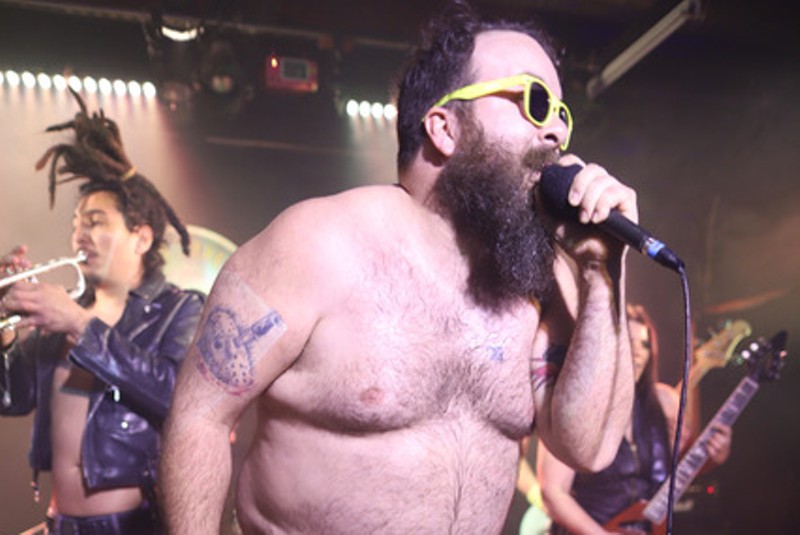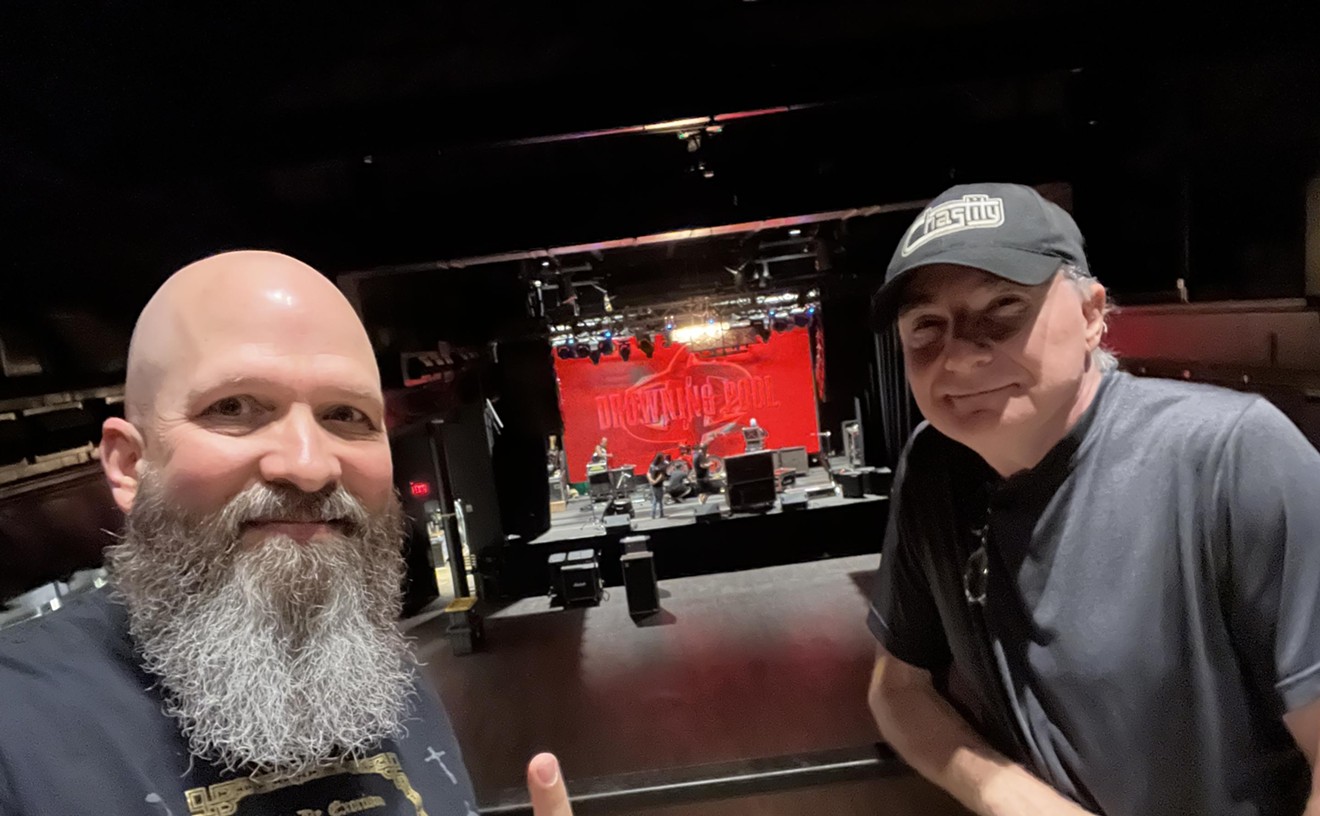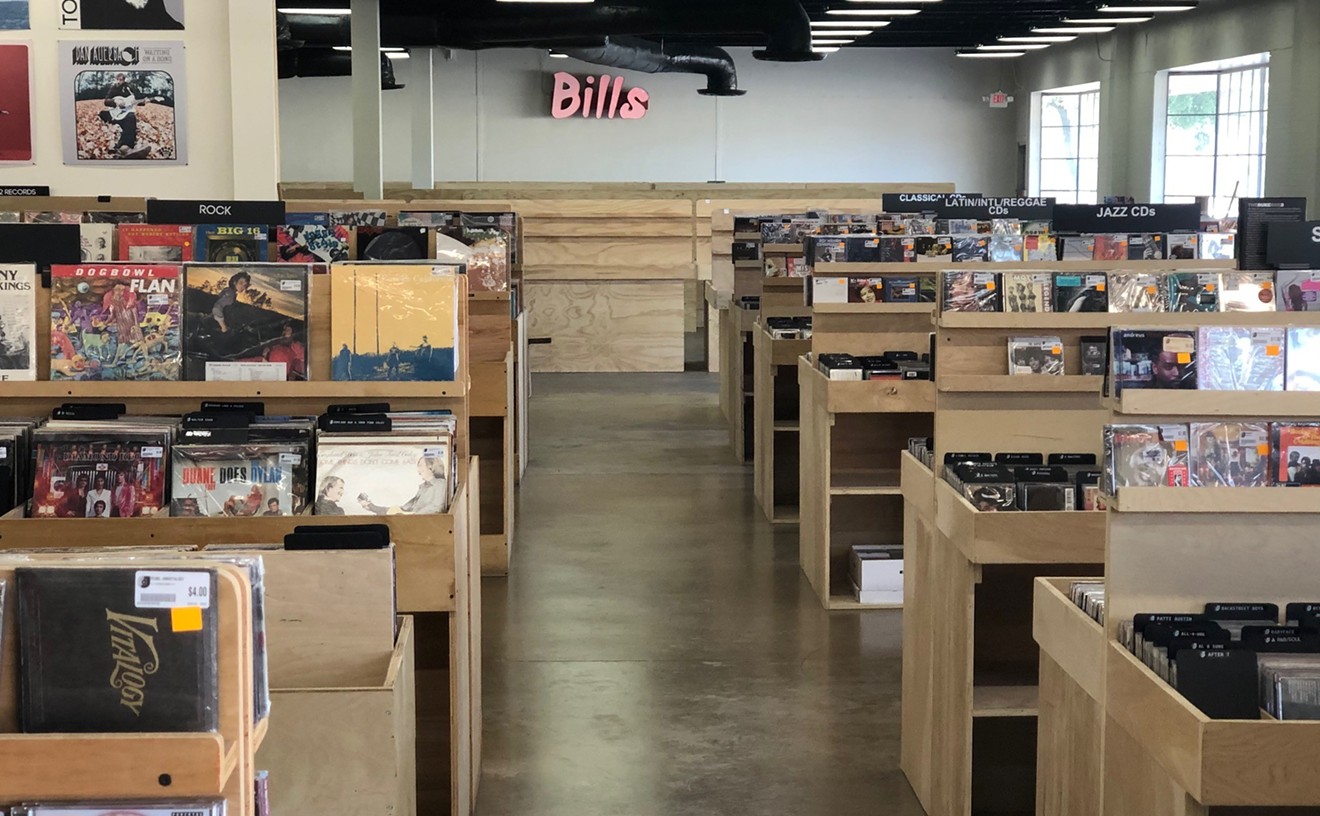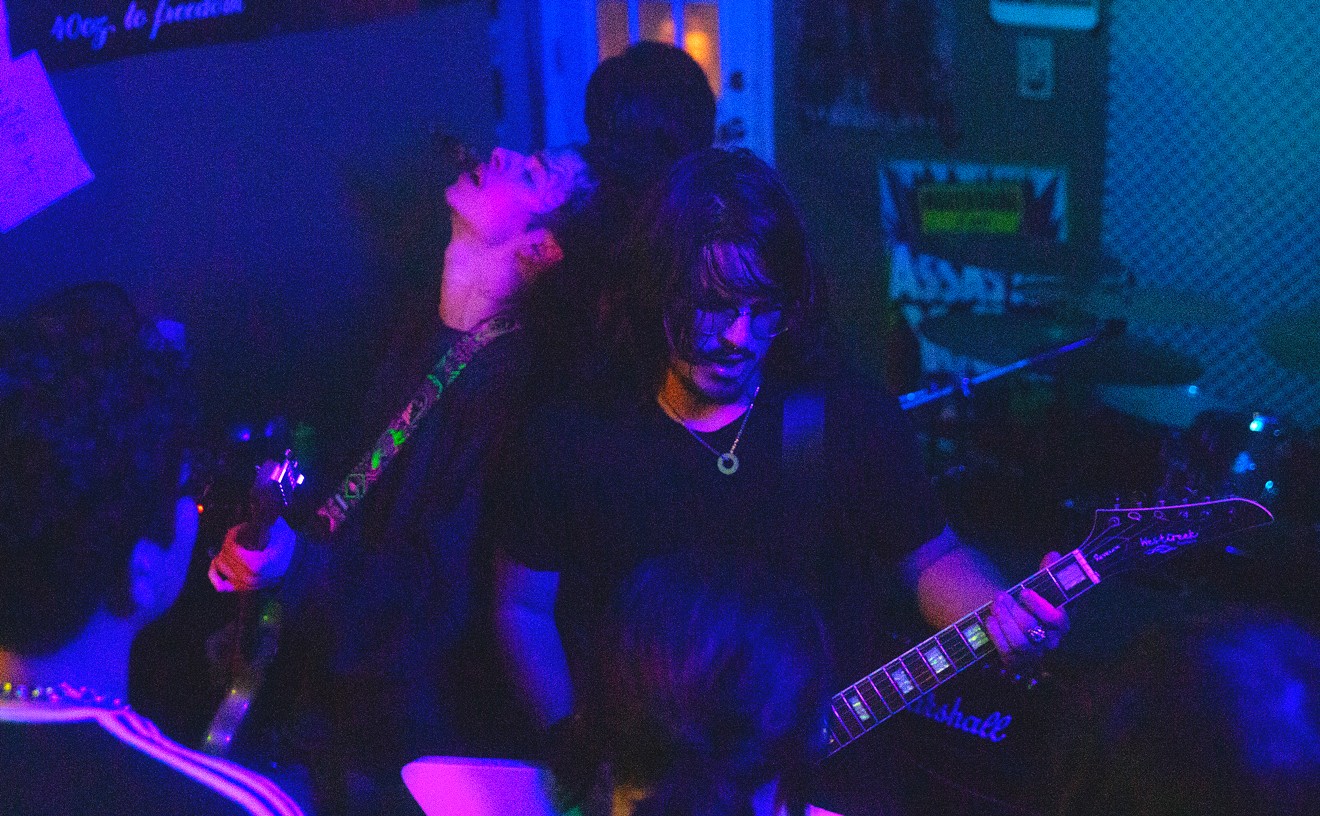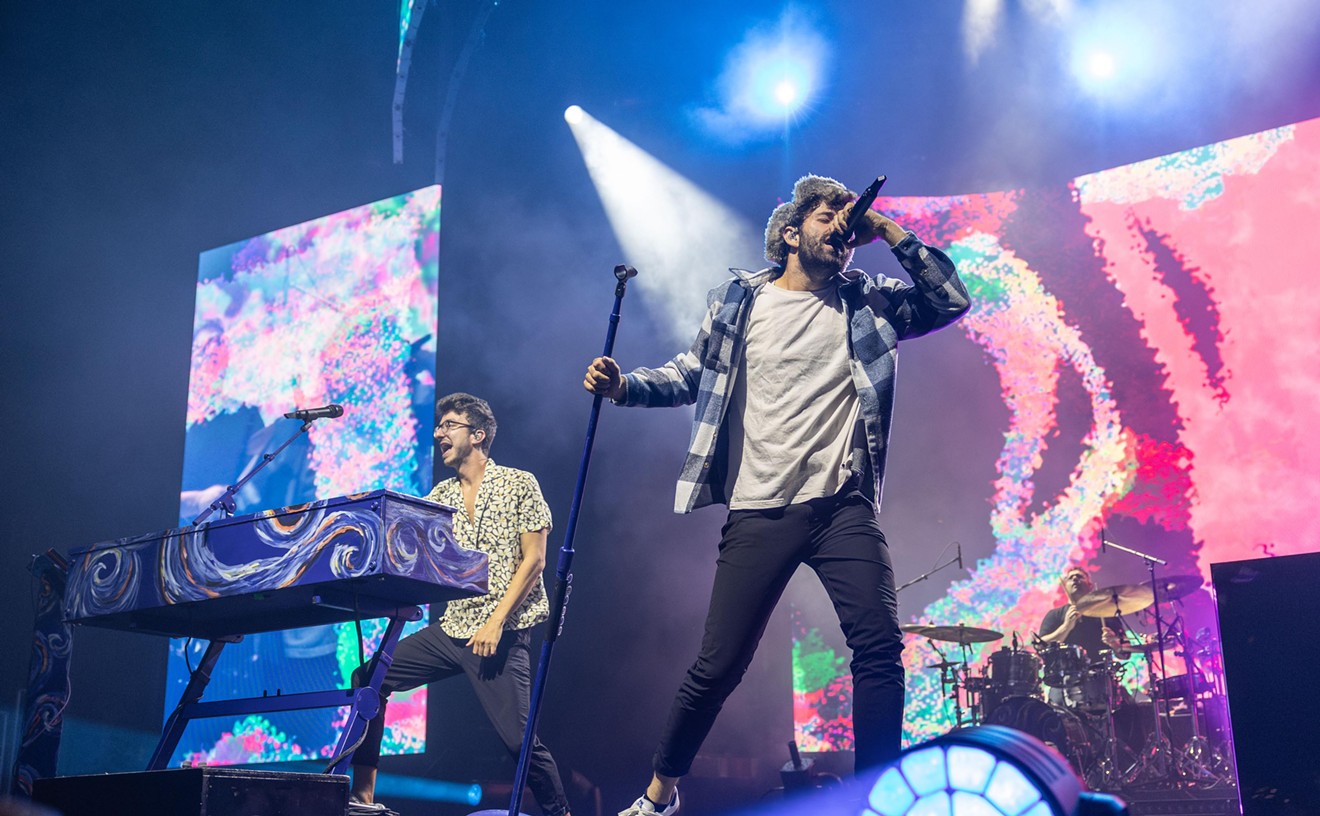Some venues' green rooms can get wild. But according to Dallas musicians, everyone’s show prep is different. The job of entertaining crowds (and audience members who don't always want to be there) is tough. Whether you’re a bassist routinely playing a local show or a DJ or a punk-rock group, chugging beers or a few whiskeys might help with pre-show jitters, just as saying a prayer or giving a band pep talk might be second nature to other groups getting ready to play.
Multi-instrumentalist and DJ Wanz Dover says that the rituals for loosening up before a gig depend on what kind of set he’s playing.
“A rock show, electronic hardware set or a DJ set, my prep changes depending on the genre," he says. "More often than not I usually listen to different music than what I’m about to play. Very often that is Blue Note/Impulse jazz. If I’m about to play disco I might be listening to some noise stuff like Boredoms or Birthday Party on the way to the gig.”
On DJ nights, Dover says he tends to cram lots of different genres together and make it make sense, a practice that extends to his pregame before a rock gig.
“I don't play as much rock nowadays but will be soon," Dover says. "A shot of Maker's [Mark whiskey], stretches and a run-through [of] scales on guitar does the trick.”
Polyphonic Spree and Tripping Daisy frontman Tim DeLaughter says his preshow ritual as a popular '90s rock group included a few hits of acid and alcohol back in the day.
“It was a gallon of booze, few hits of acid met with a free-standing backflip — this was all in a different order — depending on how fast the acid kicked in,” DeLaughter says. “These days, I’m more concerned about my figure so I don’t drink anymore and the only acid I do is the occasional flashback, and the backflips were replaced by yoga. We gather in a circle and share our problems and sing a song, then it’s time to hit the stage. I prefer my ritual these days which is much more informative and hangover-free free, plus I can palm the floor.”
Cowpunk group Vandoliers returned from an international tour a few months back. Drummer Trey Alfaro and the group played one of their biggest shows to an audience of 7,500 in the U.K. city of Wells. He finds that show prep is different for everyone.
“Me and Josh [frontman Joshua Fleming] don’t drink anymore and we’re like, 'Is it a double Red Bull kind of night?'" Alfaro says. "I also like to sit with sticks on a pad, do a couple of stretches because we’re pretty wild onstage. As far as stage fright, I think that’s gone away, but I got butterflies before stage for our first arena show, and it was an ‘Oh shit’ moment for me — but when the first note hits, it's game on, and all that goes away and we just do our thing.”
Sound checking with the sound guy and tuning instruments is the norm depending on the stage and sound tech at a venue or auditorium. Mingling with the crowd and with other bands sharing the stage helps get performers hyped. Some of the same groups enjoy performing with and seeing friends they’ve shared the stage with before. Also, reuniting in another state or country while on the road and performing with the same hometown lineup, Alfaro says, “is a fun reunion for everyone backstage.”
Whether a group is playing a local punk house show or at a music establishment, watching someone pounding beers while blaring vocals on a mic wearing a speedo can be an acquired musical taste and a lot of rowdy fun.
The Sober Solution
Richard Haskins and his group The Wee-Beasties are well-known for gusting some brews on stage, but the group members aren’t bummed out about Haskins' newfound peace with sobriety.“I don't like getting to the venue any less than an hour or so before we play. It's unsettling to go straight from the van to the stage, but unfortunately on tour that happens sometimes, and you have to be ready anyways," Haskins says. "I like to say my hellos and see what kind of crowd I'm going to be performing for. I sometimes have a problem with bringing too much energy to the table, so I like knowing how much they want.
“You can usually gauge that by talking to the people already there. I go hard regardless, but I try to be a little less than completely off-putting. Previously, I was always the type to have 10,14 tall-boy Lone Stars [beer] before I start just to build my confidence, but it turns out you can find that same confidence within yourself and from the people you have around you onstage.”
As the frontwoman for underground hardcore punk group BOOF, Rae Rumbelow says musicians play a character onstage.
“Not everyone prepares the same way," she says. "When we were younger, it was super easy to just hop out of the van like, 'Let’s fucking go.' Now it takes a little more energy to prep, so I dive into the social side of things immediately because the more charming I can be offstage, the easier it is for me to take that handful of people and mold them into a way to influence the crowd. That's what a good front is supposed to do.”
Up-and-coming 20-year-old singer-songwriter Remy Reilly has played for crowds since she was 12 years old. The musical storyteller wasn’t nervous as a child.
“It’s funny that I don’t remember being nervous after that, it was more of an excitement,” she says. “All of a sudden, this year I started getting pretty nervous before shows, and someone told me it’s because I care now. When I heard those words, it hit deep. You don’t really think about, like, every single possible outcome of a performance at 12 but at 20, I’m thinking about my voice cracking, people not liking me, is my outfit not working, am I going to play a wrong note, etc. The list goes on.
"So, what I’ve been doing to calm down is to make jokes with my bandmates; I do my weird little dances and get hyped up and turn that fear into excitement. Ever since I was told it was because I care, I no longer see nerves as a bad thing. They are only a guide and lead me to the most authentic version of myself while onstage.”

